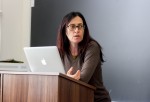A new social science master’s program aims to help students develop an interdisciplinary approach to solving social problems.
The Master of Social Science Program, which launched in September, teaches its 20 students how to address complex social issues such as environmental degradation and economic inequality by collaborating with various social science departments, said Juliet Williams, chair of the Social Science Interdepartmental Program and a professor of gender studies.
“Our emphasis in the program is on training students who come to us with an interest in a certain social problem, and we give them the tools to identify and assess research from various fields like political science, economics and gender studies,” Williams said.
The program differs from other social science master’s programs on campus, such as the history master’s program or the economics master’s program, by offering courses from different departments, Williams said. MaSS incorporates courses and professors from multiple departments, including political science and sociology, to help students analyze current social issues.
Ashley Williams, a graduate student in the program, said the MaSS program has helped her develop professional skills, such as analyzing and writing about research in multiple disciplines.
“I really appreciate the ability to engage multiple disciplines when approaching social problems so that we are not just solely looking at an issue from a psychological or sociological perspective,” Ashley Williams said. “I liked the clear interest the program has in developing us as scholars.”
Students in the MaSS program take nine courses total, seven of which are core requirements to the program taught by professors from various social science departments, according to the program’s website. Some of these core courses teach students how to approach and analyze the quantitative and qualitative data they obtain from their research.
Students also take two elective graduate courses from social science departments of their choice to help specialize their studies.
Victoria Luckenbaugh, a graduate student in the program, said she thinks students have to carefully plan their two elective courses if they want to specialize in a social science field.
“It would be great if we could get more specialization into our field of interest,” Luckenbaugh said. “We can take two electives in the fall and spring quarter, but it can be difficult to fit them in our schedule with the MaSS classes we have to take.”
Students in the program also work with faculty on research projects throughout the year and produce a final paper summarizing their findings, according to the program’s website.
Tamar Kremer-Sadlik, the academic director of SSIDP and an assistant adjunct professor of anthropology, said another goal for the program is to help students prepare for doctoral programs.
“We hope to see our students flourish,” Kremer-Sadlik said. “We believe our training is very strong and will prepare them extremely well for … graduate schools.”
Kremer-Sadlik said the program plans to enroll five to 10 more students in future years. She added the program plans to inform more students of MaSS by holding information sessions this quarter, where interested undergraduate students can meet students and faculty currently in the program.
